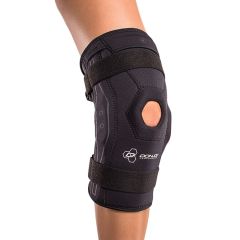Have you ever knelt down and heard your knee make a popping noise? Knee popping is a fairly common condition of the knee and it may occur with or without pain. Typically, if there is knee pain with popping, then a physician should examine your knee to determine the cause. If your knee is popping without pain, you may still want to get it checked out to ensure that your condition doesn't digress into popping knee pain. The good news is that when no pain is present, that there is a high probability that the knee popping is harmless.
In some cases, a patient may hear popping at the time of an injury. In these cases, a doctor should definitely be seen so he or she can assess your injury. Be sure to mention the popping noise as it may help the doctor determine the type of injury.
|
What causes knee popping?
Here are the most common causes of popping knee with pain: Ligament Tear - This is most often associated with knee injury popping, where a popping sensation is felt at the time of injury. ACL tears are especially known to make a popping noise during impact. Knee popping may also occur after a ligament tear, since the knee joint won't be moving normally due to the injury. Meniscus Tear - A tear in the cartilage of the knee may also cause a popping noise. Meniscus tears can occur suddenly or over time, so the onset of popping may be gradual. Since the meniscus cushions the knee joint, a tear may cause the knee to make the popping noise. It may come and go depending on the way you are walking or using your knees. Knee Hyperextension - When the knee ligaments are stretched past their normal range of motion, it may cause strained tendons. Before the joint has fully healed, a popping knee sensation may be felt. Chondromalacia or Runner's Knee - Overuse injuries to the leg may also cause knee popping. Typically during these conditions, the knee will not track properly in the joint, causing knee pain with popping. This is most common in athletes who have the onset of knee popping without a traumatic injury. Osteoarthritis of the Knee - As the knee wears down over time, it may cause the joint to move in such a way where the knee is popping and painful. The popping noise may be caused by the bones in the joint rubbing, since the cartilage has thinned out and is no longer supporting the area like it used to. The most common cause of popping knee without pain are usually gas bubbles (similar to when you crack your knuckles) or just the natural sound of your ligaments and tendons stretching as you move around. How will my doctor assess my popping knee pain?
To determine what is causing your knee popping, your doctor will assess your medical history and may ask you questions about your recent activity. If the knee popping sensation occurred at the time of injury, it is important to mention that to your doctor during your appointment. If there are other symptoms, such as knee popping and swelling, will help your physician diagnose your condition and develop a treatment plan. Further assessments may be made, such as an X-ray or MRI. In some cases fluid may be extracted from the knee and a blood test may be ordered. Treatment for Knee Popping
If your knee is popping without the sensation of pain, it may be perfectly normal. However, it is still advisable to check with your doctor at your next appointment (or right away if you are concerned or if other symptoms such as swelling or knee pain are present.). If your doctor has determined you have torn a ligament or the meniscus, then surgery may be required. After surgery, the knee may continue to pop without pain since the muscles supporting the knee may atrophy during recovery. Physical therapy and the use of a knee brace can not only help prevent knee popping, but may also help minimize the risk of re-injury. For ongoing knee popping conditions such as chondromalacia or arthritis, then your doctor may suggest rest until pain has been minimized. After that, physical therapy may be recommended to help strengthen the joint. Patella tracking braces such as the DonJoy Reaction Knee Brace may also help the joint track properly and prevent knee popping. (The DonJoy Reaction may also be used to help provide arthritis support.) Remember, if you have knee pain with popping, be sure to see your doctor to determine the cause of the knee popping and to develop the best treatment plan for your situation. Best Selling Knee Braces
|
Related Articles
|


















